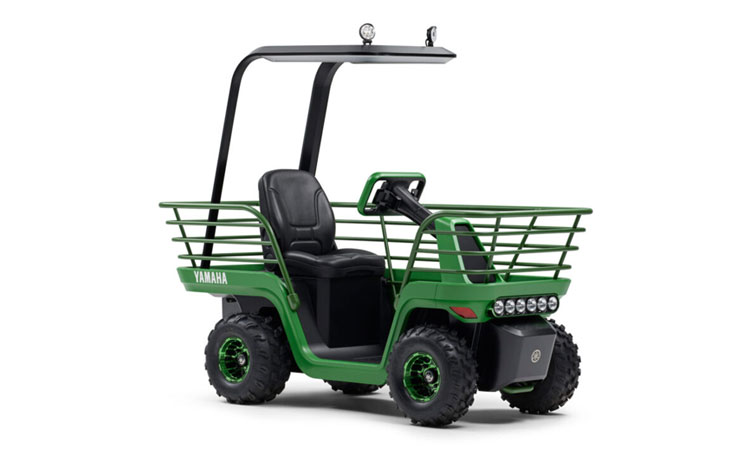The Future of Farming in Japan: Final Aim and Yamaha Motor’s Co-Created Concept EV
See how Final Aim leveraged generative AI and Autodesk Fusion to design an electric farming vehicle that blends kawaii with function.
Throughout his career as an industrial designer and entrepreneur, Yasuhide Yokoi has always taken bold approaches with technology. He was even one of the first people to use Autodesk Fusion in Japan more than 10 years ago. Now as co-founder and Chief Design Officer at Final Aim, Yokoi and his team aren’t just looking at what’s on the horizon with blockchain and generative AI. They are actively working to incorporate it and reap the benefits today.
Collaborating with Yamaha Motor on a unique design brief
Recently, the Final Aim team landed a unique opportunity to design a new electric vehicle concept and prototype for Yamaha Motor. But it wasn’t just any EV—it needed to be specifically designed for the agriculture industry and light farm work. Yokoi wasn’t familiar with the industry or even what would make a difference in the design. So, the team turned to generative AI and started asking questions.
“We first used text-to-text AI to see the potential for the design concept and gain a broader perspective about the future of agriculture in Japan and the world,” Yokoi says.
According to Yokoi, the features proposed by AI were refreshing and a completely different experience than how he would usually sit down to start a design. A key design driver and audience surfaced during the AI research.
“I don’t have any agricultural background, so I was able to catch up with the industry very quickly and efficiently,” he says. “In Japan, the average agriculture worker is 65-years-old. From this information, I understood how younger workers would need to enter the industry. We had to create a design and features that would appeal to them.”
Once the initial research was completed, Yokoi and the team took their findings and began using generative AI for visual concepts. “We broke down the answers to explore the technical features and aesthetics,” he says. “Using generative AI, we ideated more than 2,400 different design images in just a couple of weeks. From there, we narrowed it down to a couple that we wanted to pursue.”

Final Aim turned an AI vision into reality with Fusion
The timeline for the project with Yamaha Motor was only about two months, culminating with an appearance at the recent Tokyo Auto Salon. While the ideation and design concept were rapidly accelerated with AI, Yokoi recognized that could only take them so far. The design needed to be functional, validated, and manufacturable. They began building a 3D model in Autodesk Fusion that would work in the physical world. Once the 3D model was complete, they needed to hand it off directly to the manufacturer. “The handoff process through cloud features was a big advantage when using Fusion,” Yokoi says.
“We use Fusion because it enables quick development and communication between a lot of stakeholders,” he continues. “Even here in Japan, the team was distributed between Yamaha Motor in Shizuoka close to Mount Fuji, the manufacturer in Kyoto and Osaka, and myself in Tokyo. We could meet this very tight deadline with a fully developed design as well as actual manufacturing.”
“Fusion provides access to the cloud and comprehensive design features that aren’t accessible with other 3D CAD software tools. For all of our projects, we can rely on Fusion and tap into the incredible user community and even Autodesk itself for knowledge.” Yasuhide Yokoi, Co-founder and Chief Design Officer, Final Aim
It’s OK to call it cute
The final design of “Concept 451” is a quintessential blend of functionality and kawaii. The pipe-frame structure evokes a certain boldness, and visibility is increased with the removal of the typical front pillars. For Yokoi, calling it cute is a compliment and means that it’s achieving the design goals for a younger generation entering the industry.
“It was an exciting moment to see the response from the visitors, the market, and the media,” he says. “We got a lot of ‘kawaiis’ and some very helpful feedback on features to add or expand.”
The project also fulfilled a key goal for Yamaha Motor and taking a completely different approach to traditional design and product development. Their EV platform is a standard base, so a vehicle could technically run on a road the very first day. Using generative AI and Fusion, Final Aim and Yamaha Motor could experiment with a new, agile process to quickly prototype, share it with the market, and get real-time feedback.
“With Fusion, we’re taking a deeper look at the feedback and applying that on the next version,” Yokoi says. “We’re excited to see the potential users and the market for the future of EVs in the agriculture industry.”
Learn more about this project over on Design & Make with Autodesk.


